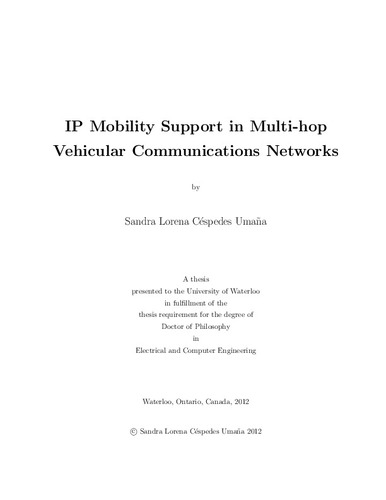| dc.description.abstract | The combination of infrastructure-to-vehicle and vehicle-to-vehicle communications, namely the multi-hop Vehicular Communications Network (VCN) , appears as a promising solution for the ubiquitous access to IP services in vehicular environments.
In this thesis, we address the challenges of multi-hop VCN, and investigate the seamless
provision of IP services over such network. Three different schemes are proposed and analyzed. First, we study the limitations of current standards for the provision of IP services, such as 802.11p/WAVE, and propose a framework that enables multi-hop communications and a robust IP mobility mechanism over WAVE. An accurate analytical model is developed to evaluate the throughput performance, and to determine the feasibility of the deployment of IP-based services in 802.11p/WAVE networks. Next, the IP mobility support is extended to asymmetric multi-hop VCN. The proposed IP mobility and routing mechanisms react to the asymmetric links, and also employ geographic location and road traffic information to enable predictive handovers. Moreover, since multi-hop communications suffer from security threats, it ensures that all mobility signalling is authenticated
among the participant vehicles. Last, we extend our study to a heterogeneous multi-hop
VCN, and propose a hybrid scheme that allows for the on-going IP sessions to be transferred along the heterogeneous communications system. The proposed global IP mobility scheme focuses on urban vehicular scenarios, and enables seamless communications for in-vehicle networks, commuters, and pedestrians.
The overall performance of IP applications over multi-hop VCN are improved substantially
by the proposed schemes. This is demonstrated by means of analytical evaluations, as well as extensive simulations that are carried out in realistic highway and urban vehicular scenarios. More importantly, we believe that our dissertation provides useful analytical
tools, for evaluating the throughput and delay performance of IP applications in multi-hop vehicular environments. In addition, we provide a set of practical and efficient solutions for the seamless support of IP tra c along the heterogeneous and multi-hop vehicular network, which will help on achieving ubiquitous drive-thru Internet, and infotainment traffic access in both urban and highway scenarios. | en |

